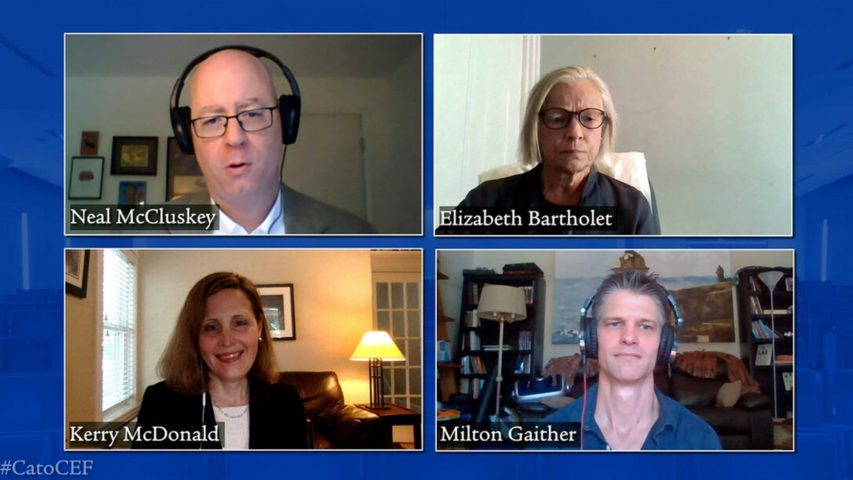By demanding that “the government” — any government, feds, provincial, municipal, preferably all of them — carry on frantically legislating into the wind, the angry talk-show callers were, in effect, being just as victimologically inclined as the somnolent correspondents of big media. Fuming and furious, they were tonally different but philosophically indistinguishable, both parties subscribing to the view that Canadian citizens are the passive charges of the nanny state and that nanny needs to put more safety bars round the nursery.
Mark Steyn, “We need professional help”, Western Standard, 2005-04-04.
June 18, 2021
QotD: Canadians and the nanny state
January 14, 2021
QotD: Collective-action problems – perfect state response versus flawed private responses
Our key insight is a pessimistic one: this is the sort of situation which, though individuals and markets don’t handle it well, isn’t actually handled well by governments either. The fundamental mistake of statist thinking is to juxtapose the tragically, inevitably flawed response of individuals and markets to large collective-action problems like this one against the hypothetical perfection of idealized government action, without coping with the reality that government action is also tragically and inevitably flawed.
The implicit burden of the article, after all, is indignation that the government has been done too little and the wrong things. What the author fails to grasp (because his thinking is warped by the religion of state-worship) is that this sort of dysfunction is not a sporadic accidental failure that could be corrected by sufficiently virtuous thoughts and deeds; it is an essential failure, entirely predictable from the incentives operating on all the actors (including the actors within government).
His sort of fantasy thinking implicitly throws a burden of proof on anarchists to construct a perfect response to something like the Deepwater Horizon disaster in a stateless system, or else have their critique of statism dismissed as heartless and inadequate. But the correct analysis is to notice that we can only do what we can only do, and compare the rationally expectable effectiveness of flawed government action against the rationally expectable effectiveness of flawed individual and market action.
The second level of error, once you get this far, is to require that the market action achieve a better outcome without including all the continuing, institutional costs of state action in the accounting. So, for example, other parts of the continuing costs of accepting state action to solve this individual toxic-exposure problem in the Deep Horizon aftermath is that Americans will be robbed every April 15th of five in twelve parts of their income (on average), and be randomly killed in no-knock drug raids. And it’s no use protesting that these abuses are separable from the “good” parts of government as long as you’re also insisting that the prospect of market failures is not separable from the good behavior of markets!
Irrational anarchists believe that utopia is somehow achievable in a stateless system; they make the exact reciprocal error from statists, believing that all evil proceeds from government. Rational anarchists like myself know that stateless systems will have tragic failures too, but believe after analysis that they would have fewer and smaller ones.
If this seems doubtful to you, do not forget to include all the great genocides of the 20th century in the cost of statism. It was contemplating those that turned me into an anarchist – because that sort of eruption of fire and blood, too, is not accidental but essential given the logic of state collectivism.
Eric S. Raymond, “Pessimistic anarchism”, Armed and Dangerous, 2010-09-15.
November 12, 2020
Puritans let no pandemic go to waste
In Spiked, Annabel Denham illustrates how the ongoing Wuhan Coronavirus pandemic has enabled and encouraged nanny state thinking:
Over the course of the past seven months, we have seen every indulgence come under fire for its supposed role not just in transmitting coronavirus but also in causing any excess deaths. Cast your mind back to the start of the crisis, when the World Health Organisation launched its #HealthyAtHome campaign, advising us to shun butter and sugary drinks, despite there being little evidence such a move would serve to limit the spread or impact of Covid-19.
Then there was the dismally weak Chinese study, which found smokers were more likely to become seriously ill from Covid, which was warmly received by the public-health establishment. It handed them their smoking gun, until it became clear smokers were significantly less likely to actually contract the disease in the first place.
Now we have the destruction of the pub industry. First there was the 10pm curfew, imposed with little regard for the fact that it would encourage house parties held in far less safe environments than heavily regulated pubs or restaurants. Advocates seemed to gloss over the evidence suggesting that less than five per cent of infected individuals contacted by NHS Test and Trace had been in close contact with another person in a hospitality venue. Then there was the clampdown on households mixing, Scotland’s first minister Nicola Sturgeon’s indoor booze ban, and the bizarre insistence that pubs in Tier 2 could only serve alcohol if food was dished out at the same time.
This pandemic has triggered renewed fervour among nanny-state obsessives – no more so than among those determined to take down the food industry. You can bet that with hospitalisations and deaths on the rise again, there will be a commensurate increase in one-sided agitprop from celebrity supporters like Henry Dimbleby or Jamie Oliver. Just last month the latter called on the government to market water – yes, water – to young people as more attractive than soft drinks and proposed an “eat well to stay well” scheme modelled on the government’s Eat Out to Help Out initiative. Meanwhile, this week the government announced that advertising junk foods like sausage rolls and fish fingers would be banned online.
If the definition of insanity is doing the same thing over and over again and expecting a different result, then the public-health lobby’s mental wellbeing is surely in doubt. According to a collection of essays by Dolly Theis, long-term advocate of anti-obesity measures, 700 policies have been proposed in Britain over the past 30 years. In reality, these are the same policies renewed, repackaged and ramped up by fanatical single-issue pressure groups, the sort who claim obesity is an epidemic when hundreds of thousands are dying by Covid’s hand.
October 25, 2020
October 20, 2020
The watchful algorithms of the Nanny State’s AI tools
David Warren considers the evolution of the Nanny State’s arsenal of technological surveillance (supplemented by the Karenstapo):
While it is not in my interest, currently, for gentle reader to get off the Internet, the idea must have occurred to him. In times like these, why put yourself under watch from Big Brother (or, Big Sibling, as he might prefer)? Why surround yourself with his electronic eyes, the way I am presently surrounded by jackhammers?
Granted, Nanny State was devising ways to track its citizens, and to exercise “crowd control,” long before the Internet was invented. But we had the advantage with them, for they were incompetent, often laughably inept. However, Internet-plus-meejah-plus-activists-plus-Guvmint makes a more capable adversary.
I am not recommending a systematic withdrawal from the world. That is for people with a religious calling, or some grave eccentricity. Rather I am thinking of self-defence, in the spirit of buying a gun. Of course, I am writing from Canada, one of the countries where owning a gun is more-or-less illegal; as is any other form of self-defence. (“When seconds count, the police will be here in minutes.”) Though I have noticed that, upcountry, the “No Hunting” signs tend to be used for target practice.
The “other side,” as I see it, which always worked on numbers, now has algorithms. “Artificial Intelligence” can home right in. The Nanny State never took the individual seriously, except when he was offering a threat. Now it is threatened by anything human. It is, as it were, utilitarian in outlook — “the greatest good for the greatest number” — along with other fatuous concepts, unamenable to reason. By its nature, it is positivist, nominalist, relativist, and “idealistic” in a very abstract way.
Whereas we, so far as we are human, take ourselves quite personally. In a clinch, we often prefer our own survival, and the survival of family and friends, to the requirements of a bureaucratic “policy.” That this is “selfish” should be immediately affirmed.
Because the masses are now deprived of a Christian education, they misconstrue the “selfishness” of Christian teaching, which tells us that we ought selfishly to become saints. Our intention should be to get ourselves to Heaven, along with any we know who can be taken with us. But charity is not “selfish,” in ways they understand. Under modern tenets of “multiculturalism,” even fidelity to the old Christian view is decried as a form of selfishness, calling out for persecution. For this is because it is “cultural,” not “multi” — for all the many languages it speaks.
Our enemy wants us to eschew uniqueness, and become instead “diverse” — by which it means homogenized and narrowly interchangeable. Increasingly, this adversary has the means to enforce its arbitrary will.
September 22, 2020
QotD: City dwellers and the state
If one wants to understand why city dwellers have a peculiarly statist politics, spend time in a big city subway system. For the people in the city, government services are essential for living. They depend on the subway, the trash collection and the police department. The city depends upon this organic relationship between the state and the citizens. That does not exist in the suburbs or the country. There’s a comfort that comes from the daily interaction with the state. Anyone who questions that relationship is suspect.
The Z Man, “Never Newark Nights”, The Z Blog, 2018-06-06.
September 7, 2020
Public compliance with masking rules
David Warren on the temptation for public health officials to treat the citizenry as slightly dim children who need direct supervision by enlightened public health officials:

“Covid 19 Masks” by baldeaglebluff is licensed under CC BY-SA 2.0
The present danger — the Red Chinese Wuhan Laboratory Batflu — is visible everywhere thanks to state-mandated muzzles or batmasks. We are now in the sixth month of “fifteen days to flatten the curve,” and I’ve noticed that these filthy mouth-pieces have become another urban environmental blight, on a scale even worse than the sidewalk basketball bouncers I recently decried. I spotted four discarded Batflu-spreaders on the sidewalk during a walk of less than one city block yesterday, to a deadbeat “supermarket” to fetch milk for my tea.
I’m sure these cloth garottes are choking our Blanding’s Turtles — already considered endangered by our provincial bureaucracy because less than one in a thousand of their eggs ever hatch, and then the adults try to cross country roads. Call up a picture of one on the Internet, and gentle reader will see that they are all apparently wearing yellow batmasks on their chins, in compliance with guvmint regulations. For if they took them off, they would risk being confused with another turtle species that might not be Protected.
But while my affection for Blanding’s Turtles, and empathy in light of their persecution by Ontario motorists, is of long standing — a friend proposes that we found a Blanding Lives Movement — I am even more concerned about the fate of our children. The Batflu has been discouragement enough, to those who may never reach maturity, but the spectacular success of the Nanny State effort to keep them socially atomized and in muzzles, portends innumerable (fake) “pandemics” to come. For what faceless time-server, “dressed in a little authority,” can resist an opportunity to treat the general population as if they were retarded children? Especially now, that the general population has shown it will comply?
According to an item that somehow slipped into the New York Times, only a tiny fraction of the much-publicized Batflu deaths were attributed to the Batflu alone, on death certificates sampled from across the Natted States. By this focus, the “pandemic” toll is reduced from the official number of 187,777 (I just checked this morning), to about 9,200. Of course, the commie and never-Trumper meejah have gone splenetic to “cancel” this interesting fact. It is as bad as the French study which showed that your one-in-ten-thousand chance of dying with the Batflu in that country is cut a further five times if you happen to smoke. Or the Hydroxychloroquine scandal, in which Mister Trump suggested (correctly) that a simple anti-malaria drug, already mass-produced and dirt cheap because long out of patent, can cut it by a few times more.
July 25, 2020
June 20, 2020
Opposition to home schooling is merely a side-issue for those who want government to control everything
Kerry McDonald recently took part in a debate with a Harvard academic who has called upon governments to ban homeschooling. She’s written up some of the things she took away from the discussion and from the many questions submitted before the event:
While this event was framed as a discussion about homeschooling, including whether and how to regulate the practice, it is clear that homeschooling is just a strawman. The real issue focuses on the role of government in people’s lives, and in particular in the lives of families and children. In her 80-page Arizona Law Review article that sparked this controversy, Professor Bartholet makes it clear that she is seeking a reinterpretation of the US Constitution, which she calls “outdated and inadequate,” to move from its existing focus on negative rights, or individuals being free from state intervention, to positive rights where the state takes a much more active role in citizens’ lives.
During Monday’s discussion, Professor Bartholet explained that “some parents can’t be trusted to not abuse and neglect their children,” and that is why “kids are going to be way better off if both parent and state are involved.” She said her argument focuses on “the state having the right to assert the rights of the child to both education and protection.” Finally, Professor Bartholet said that it’s important to “have the state have some say in protecting children and in trying to raise them so that the children have a decent chance at a future and also are likely to participate in some positive, meaningful ways in the larger society.”
It’s true that the state has a role in protecting children from harm, but does it really have a role in “trying to raise them”? And if the state does have a role in raising children to be competent adults, then the fact that two-thirds of US schoolchildren are not reading proficiently, and more than three-quarters are not proficient in civics, should cause us to be skeptical about the state’s ability to ensure competence.
I made the point on Monday that we already have an established government system to protect children from abuse and neglect. The mission of Child Protective Services (CPS) is to investigate suspected child abuse and punish perpetrators. CPS is plagued with problems and must be dramatically reformed, but the key is to improve the current government system meant to protect children rather than singling out homeschoolers for additional regulation and government oversight. This is particularly true when there is no compelling evidence that homeschooling parents are more likely to abuse their children than non-homeschooling parents, and some research to suggest that homeschooling parents are actually less likely to abuse their children.
Additionally, and perhaps most disturbingly, this argument for more state involvement in the lives of homeschoolers ignores the fact that children are routinely abused in government schools by government educators, as well as by school peers. If the government can’t even protect children enrolled in its own heavily regulated and surveilled schools, then how can it possibly argue for the right to regulate and monitor those families who opt out?
June 18, 2020
QotD: The feminization of culture
What’s happening to pop culture is a reflection of our age. We’ve been turned into Pandas by a smothering, soft totalitarianism. The feminization of the culture means we’re ruled by mothers, who refuse to ever let us wander from the nest, physically, spiritually, creatively or intellectually. That has had all sorts of effects, like the drop in sperm counts and the collapse of popular culture. A deracinated people, kept in adult daycare centers and tended to by belligerent spinsters is not going to have a lot to celebrate or live for.
“The Z Man”, “The Soundtrack Of This Age”, The Z Blog, 2018-03-15.
May 8, 2020
The Wuhan Coronavirus lockdown – “perhaps the worst policy mistake ever committed by Western governments during peacetime”
Toby Young on the fall of “Professor Lockdown”, the former top advisor to the British government on the response to the Wuhan Coronavirus epidemic:
The reason for looking into the political affiliations of the scientists and experts who’ve been advising governments across the world during this crisis is that it may throw some light on why those governments have made such poor policy decisions. Will the vast majority of those advisers turn out to be left-of-centre, like Professor Ferguson? I’m 99% sure of it, and I think that will help us to understand what’s happened.
I don’t mean they’ve deliberately given right-of-centre governments poor advice in the hope of wrecking their economies for nefarious party political reasons or because they’re members of Extinction Rebellion and want to destroy capitalism. Nor do I believe in any of the conspiracy theories linking these public health panjandrums to Bill Gates and Big Pharma and some diabolical plan to vaccinate 7.8 billion people. I have little doubt they’ve acted in good faith throughout – and that’s part of the problem. The road they’ve led us down has been paved with all the usual good intentions.
The mistakes these liberal policy-makers have made are depressingly familiar to anyone who’s studied the breed: overestimating the ability of the state to solve complicated problems as well as the capacity of state-run agencies to deliver on those solutions; failing to anticipate the unintended consequences of large-scale state interventions; thinking about public policy in terms of moral absolutes rather than trade-offs; chronic fiscal incontinence, with zero inhibitions about adding to the national debt; not trusting in the common sense of ordinary people and believing the only way to get them to avoid risky behaviour is to put strict rules in place and threaten them with fines or imprisonment if they disobey them (and ignoring those rules themselves, obviously); arrogantly assuming that anyone who challenges their policy preferences is either ignorant or evil; never venturing outside their metropolitan echo chambers; citizens of anywhere rather than somewhere… you know the rest. We’ve seen it a hundred times before.
More often than not, the “solutions” these left-leaning experts come up with make the problems they’re grappling with even worse, and so it will prove to be in this case. The evidence mounts on a daily basis that locking down whole populations in the hope of “flattening the curve” was a catastrophic error, perhaps the worst policy mistake ever committed by Western governments during peacetime. Just yesterday we learnt that the lockdowns have forced countries across the world to shut down TB treatment programmes which, over the next five years, could lead to 6.3 million additional cases of TB and 1.4 million deaths. There are so many stories like this it’s impossible to keep track. We will soon be able to say with something approaching certainty that the cure has been worse than the disease.
May 1, 2020
Theodore Dalrymple on the authoritarian innovations we’ve so meekly accepted thanks to the Wuhan Coronavirus epidemic
Getting back to “normal” is going to be much more difficult now that the powers-that-be know for certain that we’re all quite comfortable tugging the forelock and bending the knee given the right kind of orders:

Armed Metropolitan Police near Downing Street in London.
Photo by Stanislav Kozlovskiy via Wikimedia Commons.
As for the collective or political lessons of the epidemic, I fear them more than rejoice in them. They seem to me likely to reinforce a tendency to authoritarianism, and to embolden bureaucrats with totalitarian leanings. One of the surprising things (or perhaps I should say the things that surprised me) was how meekly the population accepted regulations so drastic that they might have made Stalin envious, all on the say-so of technocrats whose opinions were not completely unopposed by those of other technocrats. There was, as far as I can tell, no popular demand for the evidence that supposedly justified the severe limitations on freedom that were imposed on the population. I suppose an encouraging interpretation of this readiness of the population to do as it was told is that it demonstrated that, all the froth and foam of opposition to political leaders notwithstanding, fundamentally the authorities were trusted by the population to do the right thing. Much as we lament, therefore, the intellectual and moral level of our political class, there are limits to how much we despise it. In other words, we believe that our institutions still work even when guided or controlled by nullities.
A less optimistic interpretation, as usual, is possible. Our population is now so used to being administered, supposedly for its own good, under a regime of bread and circuses, that it is no longer capable of independent thought or action. We have become what Tocqueville thought the Americans would become under their democratic regime, namely a herd of docile animals. Only at the margins — for example, the drug-dealers of banlieues of Paris — would the refractory actually rebel against the regulations, and that not for intellectual reasons or in the name of freedom, but because they wanted to carry on their business as usual. (I should perhaps mention here that I number myself among the sheep.)
In Britain, at any rate, the epidemic revealed how quickly the police could be transformed from a civilian force that protects the population as it goes about its business into a semi-militarised army of quasi-occupation. This transformation is not entirely new, alas; it has been a long time since the policeman was the decent citizen’s friend. Under various pressures, not the least of them emanating from intellectuals, he has become instead a bullying but ineffectual keeper of discipline, whom only the law-abiding truly fear.
I first sensed this development many years ago this when a traffic policeman asked to see my licence. “Well, Theodore …” he started, calling me by my first name when a few years before he would have called me “Sir.” This change was significant. I had gone from being his superior, as a member of the public in whose name he exercised his authority, to being a kind of minor, whom it was his transcendent right to call to order. He was now the boss, and I was now the underling.
The change in uniform, too, has worked in the same direction. Traditionally, since the time of Sir Robert Peel, the uniform of the British policeman was unthreatening, deliberately so, his authority moral rather than physical. Now, he is festooned with the apparatus of repression, if not of oppression, though in effect he represses very little of what ought to be repressed in case it fights back. The modern police intimidate only those who do not need deterring; those who do need it know that they have nothing much to fear from these whited sepulchres, these empty vessels. Incidentally, the French police have undergone a similar deterioration in appearance: gone is the reassuring képi in favour of the moron’s baseball cap, and some of them now dress in jeans with a black shirt with the word POLICE across its back, which is not difficult to imitate and makes it impossible to know whether a policeman really is a policeman or a lout in disguise.
The Covid-19 epidemic has come as a great boon to the British police. Increasingly criticised for their concentration on pseudo-crimes such as hate speech at the expense of neglecting real crimes such as assault and burglary, to say nothing of organised sexual abuse of young girls by gangs of men of Pakistani origin, they could now bully the population to their heart’s content and imagine that in doing so they were performing a valuable public service, preserving the law and public health at the same time. Thus they transformed their previous moral and physical cowardice into a virtue.
Of course, in bullying the average citizen who was very unlikely to retaliate they took no risks, unlike with genuine wrongdoers and law-breakers, who tend to be dangerous; but the fact remains that most individual policemen joined the force motivated by some kind of idealism, a desire to do society some service, though they soon had these naïve fantasies knocked out of them by the morally corrupt or bankrupt leadership of the hierarchy which owes its ascendency to its willingness to comply with the latest nostrums of political correctness. The faint embers of the policeman’s initial idealism were no doubt rekindled by the opportunity to prevent the spread of the virus, as they supposed that they were doing, but some of them, at least, far exceeded even their flexible and vaguely-defined authority and began to inspect citizens’ shopping bags to determine whether they were hoarding goods that might be in short supply. This was a step too far, and at last there were protests; the police desisted.
April 30, 2020
CITIZENS! Report any non-socially-distanced deviationist behaviour to this number immediately!
In Maclean’s, Jen Gerson admits that she has not (yet) reported any of her neighbours for their failure to obediently follow the rules of social distancing. She must be reported to the appropriate state authorities!

Commemorative badges of the German Democratic Republic’s Ministry of State Security (Stasi).
Wikimedia Commons.
Look, I know I’m going to get flak for this, but someone needs to say it: think twice before you narc on your neighbours.
Snitching may work, but the downsides to citizen-policing are grim — to say nothing of the historical antecedents.
Firstly, “you can play havoc with somebody just by snitching on them with an anonymous snitch line,” noted Sharon Polsky, the president of the Privacy and Access Council of Canada. In addition to the risk of malicious reports, if people of colour aren’t disproportionately subject to snitching, I’d be shocked.
Totalitarian states turned neighbour against neighbour and family against family, in order to maintain the illusion of social cohesion.
Authoritarians use this tactic because there are never enough police or soldiers to force compliance upon an entire population, not unless everyone consents to become an agent of his or her own mutual oppression.
The term “fascism” has an innocent history. It comes from the Roman term “fasces,” which means a bundle of sticks bound together. One stick breaks, but the fasces remains strong. It’s another term for unity. That’s what makes it so seductive, especially in times of uncertainty and mortal dread. We’re all in this together. Nary a stick shall stray.
“We are now living amid the very tactics that the West [once] criticized,” Polsky added. “With state controls on commerce, industry, speech, and media.”
The federal government, for example, is already considering legislation that would bar the spreading of misinformation about COVID-19 online.
“Extraordinary times require extraordinary measures and it is about protecting the public,” Privy Council President Dominic LeBlanc told reporters with a line that should give any student of history the creeps.
“This is not a question of freedom of speech. This is a question of people who are actually actively working to spread disinformation, whether it’s through troll bot farms, whether [it’s] state operators or whether it’s really conspiracy theorist cranks who seem to get their kicks out of creating havoc.”
No doubt LeBlanc et al are operating under the noblest of intentions. But repressive measures buy conformity at a terrible price. Snitch lines turn us against one another. They teach us to fear the people we need to survive, thus making us more dependent on the apparatus of the state.
April 29, 2020
“If it saves just one life…”
Antony Davies and James R. Harrigan on the rallying cry of the Karens of all genders:
In times of crisis, politicians want to look like they’re doing something, and don’t want to hear about limits on their authority. In times of crisis, people want someone to do something, and don’t want to hear about tradeoffs. This is the breeding ground for grand policies driven by the mantra, “if it saves just one life.” New York Governor Andrew Cuomo invoked the mantra to defend his closure policies. The mantra has echoed across the country from county councils to mayors to school boards to police to clergy as justification for closures, curfews, and enforced social distancing.
Rational people understand this isn’t how the world works. Regardless of whether we acknowledge them, tradeoffs exist. And acknowledging tradeoffs is an important part of constructing sound policy. Unfortunately, even mentioning tradeoffs in a time of crisis brings the accusation that only heartless beasts would balance human lives against dollars. But each one of us balances human lives against dollars, and any number of other things, every day.
Five-thousand Americans die each year from choking on solid food. We could save every one of those lives by mandating that all meals be pureed. Pureed food isn’t appetizing, but if it saves just one life, it must be worth doing. Your chance of dying while driving a car is almost double your chance of dying while driving an SUV. We could save lives by mandating that everyone drive bigger cars. SUVs are more expensive and worse for the environment, but if it saves just one life, it must be worth doing. Heart disease kills almost 650,000 Americans each year. We could reduce the incidence of heart disease by 14 percent by mandating that everyone exercise daily. Many won’t want to exercise every day, but if it saves just one life, it must be worth doing.
Legislating any of these things would be ridiculous, and most sane people know as much. How do we know? Because each of us makes choices like these every day that increase the chances of our dying. We do so because there are limits on what we’re willing to give up to improve our chances of staying alive. Our daily actions prove that none of us believes that “if it saves just one life” is a reasonable basis for making decisions. Yet, when a threat like the coronavirus emerges, we go looking for an imaginary cure that will save lives without tradeoffs.
April 26, 2020
“If it saves just one life…”
Hector Drummond illustrates the moral failure of falling back on the “if it saves just one life” trope as a justification for any and all restrictions on free people:
Let me ask you a question. Would you give up your job, your savings, your kids’ economic future, your pension, your parents’ current pension, your house, and your mental health, if I told you that doing so may possibly extend my old, sick grandfather’s life by a year or two? I don’t suppose you’d be too keen, would you? In fact, even the most mild-mannered of people is likely to get angry at the sheer effrontery of such a request.
What if I told the world the same thing? What if I told the world that if everyone in every country gave up their wordly possessions, and spent the rest of their lives in grinding poverty, then it’s possible that my grandfather might get to see Christmas? And suppose that there was some bare plausibility to this, based on a computer model developed by scientists at Imperial College. What do you think the world is likely to say to me? The polite response would be, “Sorry to hear about your grandfather, but we’re not going to do this”. The less polite response would be more like … well, just incredulous laughter, and slammed doors.
The reason I bring up these hypothetical scenarios, though, is that all over social media we are hearing about the Covid-19 lockdown being “worth it if it saves just one life”. But would the people saying this really be willing to give up, say, their own house, car and possessions and teenage daughter to someone who is suicidally depressed over their lack of prospects in life? No. Would they be prepared to serve ten years in jail if it saved the life of someone at risk of being killed by gangsters? No. Would they be happy with having the government forcibly remove a kidney from them to extend the life of someone with failing kidneys? No. Economic ruin and loss of liberty is not something we generally regard as a fair trade for a stranger’s life. Generally even the bleeding hearts among us will say, and rightfully so, “I’m sorry for this person, but they are not entitled to this, and I will not damage my life to any great extent for them”. Charitable donations are one thing. So is volunteer service. But that’s it.
Another thing I am seeing is people who say, “Anything is worth it if it saves lives”. Anything? Really? Shall we ban alcohol then? Because some people die from alcohol. Cars? Paracetamol? Steak knives? Shall we ban mobile phones, because terrorists might use them to communicate with? Shall we lock up for life anyone convicted of a minor juvenile crime, in case they turn out to be a killer? The whole idea is too ridiculous for words, yet all over the world there are fearful people hiding in their homes and posting such thoughts. It is one thing to feel sorry for them, but their stupid ideas shouldn’t pass unchallenged.










